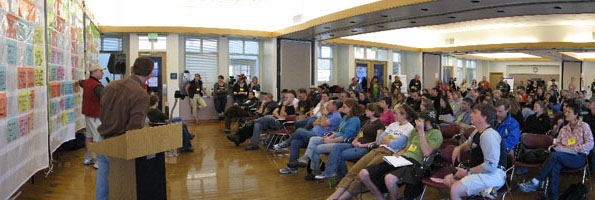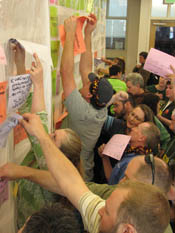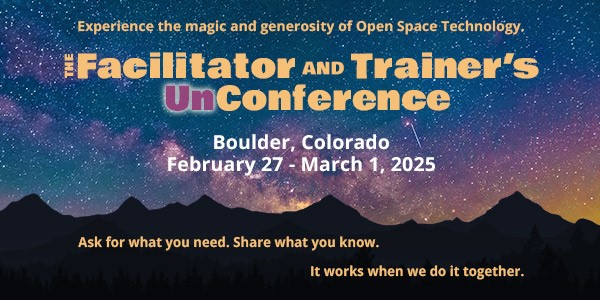OPEN SPACE?
The explanation you've been waiting for …
Open Space is an incredible meeting technology developed by Harrison Owens in the 1970's. Harrison observed the tendency for people to self-organize into groups so he created a process that facilitates a high degree of spontaneity, choice, and personal responsibility.
Since 1993, thousands of participants have experienced the magic and generosity of Open Space Technology. The process ignites the formation of a dynamic learning community.
Our process begins by building community through “connection before content”. We inquire about challenges and needs. We share strengths, skills and expertise. As we move deeper into the process, we begin to discover all we share in common AND the vast resources in the room! Open Space intends that we learn from each other. This process makes the connections that create the content for each session presented during the UnConference.
There are (4) four types of sessions:
Presentation: Expertise with advance preparation
A session by a person with expertise who has come prepared to do a session, perhaps even including handouts, overheads, videos, props, etc …
Workshop: Expertise presented on request
A session by a person with expertise who may be responding to a request by another participant. While this type of session may not be as polished as the “presentation” above, these tend to be passionate and frank opportunities for the sharing of information.
Discussion: The act of talking in which the pros and cons or various aspects of a subject are considered.
This type of session is much more free form. The convener agrees to facilitate a discussion by a group of participants who have chosen to meet to share their experiences or voice their concerns on a particular topic.
Fun Stuff: Games, activities, ice breakers with or without props, etc.
The only requirement here is that it's active and fun.
The (4) four types of sessions allow participants to attend the topic and type of session that best fits their needs. Once in a session, participants are encouraged to choose to move to a different session if the one they selected is not meeting their needs. This process gives “personal responsibility” a whole new meaning in this conference setting. If at the end of the scheduled session, the participants and the presenter wish to continue with the topic, they have 2 choices:
- Move to an open breakout and continue the session or schedule another day and time to continue.
- Schedule a “Part 2” the next morning during Open Space.
We will reconnect on Friday and Saturday at 8:00 am. This is when things really get exciting! New sessions are created! Part 2 sessions are added! We negotiate with presenters to repeat a session or we rework a time block on the schedule to ensure that interest conflicts get resolved. The most amazing part of this process is that participants learn they can create what they need!
A Call for Presenters and Participants!
Clear your mind and ask yourself these questions …
- What burning questions or topics do I want addressed?
- What areas of expertise can I offer to my peers?
- Do I have a presentation or workshop that I would be willing to offer?



